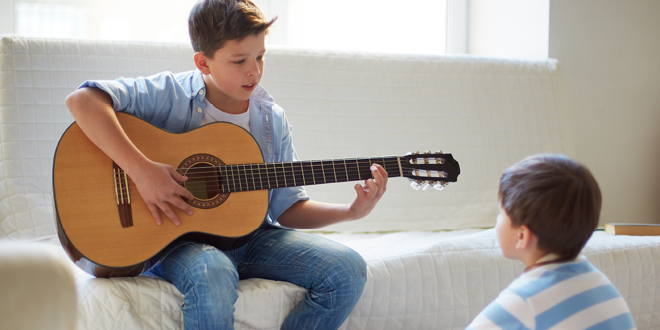Giving Your Child The Gift Of Music

The benefits of giving your child the gift of music are great in number! Amongst them, your child will develop a new skill, they will be given the opportunity to write, perform and generally enrich their life in a way many other hobbies do not offer and the benefits are not limited to visible payoffs!
“I think music in itself is healing. It’s an explosive expression of humanity. It’s something we are all touched by. No matter what culture we’re from, everyone loves music.” Billy Joel
From the first time your child picks up a musical instrument through to the day they finally crack that legendary solo, they are benefitting in so many ways that at first you might not realise but we
have a list of just some of the ways that your child can benefit from the gift of music.
Increased Memory Skills
Learning to play a musical instrument teaches a child how to create, store and retrieve memories more effectively.
An Understanding Of Perseverance And Sense Of Achievement
Learning to play a musical instrument takes time and practice and under tuition from a professional tutor, your child will be set short and long term goals – they will need perseverance to achieve the goals but once they do they will feel a sense of achievement.
Improved Co-Ordination
Playing a musical instrument requires the brain to work at high speeds, reading music is converted in the brain to the physical motion of playing the instrument and children who play musical instruments often have improved hand-eye co-ordination.
Improved Maths Skills
Playing a musical instrument may appear to be a creative act but there are actually many parallels to maths. Music and maths are interwoven – by understanding beat, rhythm and scales, children are learning to divide, create fractions and recognise patterns.
Improved Reading
Learning and playing music requires constant reading and understanding, children need to identify a note on a page and recognise which note to play, how long to hold it, what finger to use and how loud to play it.
An understanding Of Responsibility
Most musical instruments require maintenance – anything from oiling to tuning. Encouraging your child to stay on top of maintenance creates a level of responsibility for them and when they are responsible for something they are more likely to take care of it.
Exposure To Culture And History
Music is often a reflection of the culture and era it was written. Exposing a child to multiple types of musical genres allows them to glimpse into the past. Understanding the origins of music can give a child a deeper appreciation of what they are playing.
Improved Social Skills
Depending on the musical instrument, if your child plays their musical instrument in a group setting they are required to play together and collaborate, interacting with other children giving
them the opportunity to make friends and relate to others.
By Jacob White





